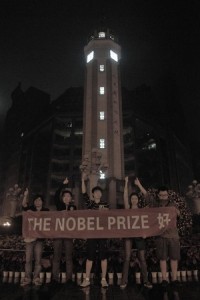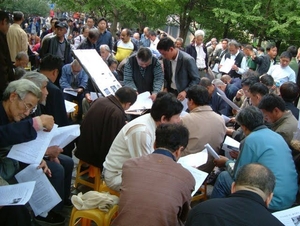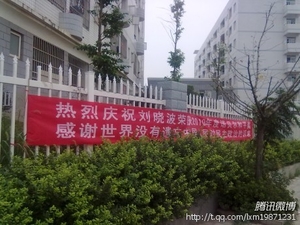Pending his acceptance speech, discussion around China's first Nobel laureate [1], Liu Xiaobo [2], has ranged from his nomination [3] and the censorship which followed his win [4], his writings [5], suitability [6], the talking points against him [7], his detractors [8], how many people [9] know who Liu is, if any [10], the subsequent house arrest of his wife [11], and whether, if an award for Liu is an award for moderate progress in China, who might have made a better candidate [12].
A number of related quotes collected from popular Chinese social network website Renren [13] can be found here [14] [zh].
From the blogs:
The upside to harmonizing news of the Nobel Peace Prize, Infrared [15]:
如果不是诺贝尔和平奖,我可能不会想到去搜索这个名字。
文革是父母那一代的事,六四是我姐那一代的事,我们这一代好像什么事也没赶上,除了改革的春风。
到了3字头的年纪,耳边除了房子车子孩子的讨论鲜有其他话题。倒不是说唯恐天下不乱,能够成长在这样的”太平盛世“实在算是幸运。但是有的时候会自省反思,我们这一代人的理想是什么?为什么应该愤青应该犯傻的年纪却一个个老成得像棱角磨平的中年人?
每个国家都有自己的问题,就像家家有本难念的经。法国目前的大规模罢工仅仅是为了反对退休年龄推后2年,这在中国不就是一个指令下来大家举手赞同嘛?民主有的时候在我们这些成长在专制国家的人看来就像胡闹,如同新闻里台湾立委们在会议上打群架一样匪夷所思。
几年前曾经看过一个视频介绍一位新加坡的民运人士,才发现不管在多么繁华的城市,都有人情愿放弃小康生活去坚持一个信仰,尤其是这种牺牲放在历史长河里简直微小的激不起一朵浪花,而对于他个人及家庭却是一辈子,人只有一辈子,那么这样的牺牲值得吗?
刘晓波没有子女,他和老婆的共识就是不要连累下一代。对于这样的境界我是十分钦佩的,虽然我并没有看过他的作品。
我非常反感那些举着民族主义大牌说脏话的人,他们除了显示无知和低素质以外什么也没有,这样的人如果是大多数,中国真的没什么希望。所以,政府封锁诺贝尔和平奖的消息倒是件好事,省了网上很多叫骂和口水。
The Cultural Revolution [16] was my parents’ generation, June 4th [17] was my sister's, and now my generation doesn't really have much going on except to enjoy the spring breeze post-reforms.
Now that I'm in my thirties, aside from mortgages, car payments and kids, there isn't much else to discuss. Which isn't to say that we're afraid of chaos breaking out, we're actually pretty lucky to have grown up in this ‘age of peace’. But one sometimes does wonder, just what are the ideals of our generation? Is our only choice between being young and angry and acting stupid, then mellowing out with middle age?
Every country has its own set of problems, the same way every family does. France is on strike now just over whether or not to push the age of retirement up two years; if it were China, an order would be come down and everyone would just raise their hands in support. To those of us raised in an authoritarian country, democracy at times can seem like child's play, such as legislators in Taiwan fighting each other in session [18], unimaginable.
A few years ago, I saw a video about one democracy activist in Singapore, and it was then that I realized that no matter how bustling a city is, there will always be people willing to forego a xiaokang [19] life to pursue a belief in something, even if that means sacrificing everything and being able to change nothing. For him and his family, this means for life, and people only have one, so is this kind of sacrifice really worth it?
Liu Xiaobo has no children, he and his wife are in consensus that they don't want to burden the next generation. I highly admire this kind of stance, even if I haven't seen his works. I completely detest people who play off nationalism in attacking others, they only come off as ignorant and backwards. If the majority of people in China were like this, China would have no hope. Which is why it's a good thing that the government has blocked news about the Nobel Peace prize, sparing us so much ad hominem blather online.
The impact it might have, Folboy, looking at [20] British newspaper coverage of Liu's award and a Financial Times editorial in particular:
评论说,许多人怀疑诺奖委员会让北京政府尴尬的做法,是否能激起中国的政治改革,认为在短期内会导致中国和西方的冲突。不仅是中国的民族主义者会仇视外界对中国事务的干预,而且许多知识分子也认为国际社会没有给中国30年来经济和个人自由都迅速发展的事实予以应有的认可。
但是评论说,刘晓波的获奖会在中国迅速变化的社会产生巨大影响。尽管中国现在提倡多党竞争、民主选举的还不普遍,但越来越多的人呼吁更大程度的自由和人权,而刘晓波的获奖会让人们希望当局在这方面做出改变的要求更强烈。
The article also says that awarding Liu Xiaobo will have huge impact on China's rapidly-evolving society. Although calls in China for multiparty democracy and democratic elections are not widespread, more and more people, however, are calling for greater freedoms and human rights, and an award for Liu Xiaobo will see people making much stronger demands on authorities for changes to this effect.
The first Han Chinese Nobel laureate: a signal of the world's growing acceptance of Han culture, financial news editor and China Value blogger [21], Luo Mo:
刘晓波的获奖,是西方文化向东方文化伸出了橄榄枝。有反对者可能会说,西方人的确是伸出了橄榄枝,可刘晓波没有对汉人伸出橄榄枝,关于这个问题,我觉得最明智的态度,不知者就不要参与争辩,真实的感受是,如人饮水,冷暖自知,有第一手真实感受的时候再说,不轻易表态是最佳表态。但不表态,也不是无作为,而是有着自己清晰的立脚点。
高行健也获得了诺奖,但他获奖的国籍是法国,而且他参评的文学作品也是翻译成法文,才入选参评的。而以汉语言、中国国籍参与进来并获奖的,刘晓波是第一人。刘晓波的获奖意味着,西方文化对汉文化的关注已经显示出了诚意。这是世界文化相互交融的一件大事,是一个新时代的开始。汉文化开始以自己的角色走向世界,当然确切地说汉文化早已走向了世界,而这里所指的强调是一种文化的相互认可,这个被广泛认可的界线,就可划在发生于2010年10月8日宣布刘晓波获得诺贝尔奖的这一天,这一天汉语体系与英语体系获得了空前默契。
当然刘晓波的诸多见解,也并非为笔者所完全认同。我只是为汉语言文字,西方人开始认真倾听,并做出诚恳的反馈,而感到非常欣慰。
Gao Xingjian [22] has also won a Nobel, but he won it as a citizen of France; what's more, the works considered and for which he won the award were French translations. Speaking of the Han language [23] and of citizens of China to have won the award, Liu Xiaobo is the first. Liu Xiaobo's win illustrates the sincerity of Western culture's interest in Han culture [24]. This is a significant event in terms of exchange of the world's cultures, and the beginning of a new era. Han culture is entering the world on its own terms, but of course it would be more precise to say that Han culture has long been out in the world, and the emphasis now is a sort of mutual recognition of cultures, a line which can be definitively drawn beneath October 8, 2010, the day Liu Xiaobo was awarded the Nobel prize, and the day on which the Han and English language systems reached an unprecedented understanding.
Of course, I don't fully agree with many of Liu Xiaobo's views. I'm merely speaking of the Han language, how Westerners have begun listening in earnest and have now given some sincere feedback, for which I am truly appreciative.
A Nobel Peace Prize's role in a Chinese theory of change, yanbin [25]:
中国的进步当然要靠中国人自己争取,但是没有国际社会舆论的支持,显然这种进程会异常的艰难。中国近两百年来的历史发展,有哪次是仅靠中国人自己的力量来推动了?
此次刘晓波被授予诺贝尔和平奖,多少还证明西方国家和各种独立组织还是关注中国人权的,某些程度上他们是可以信任的。中国的进步绝不能仅靠外部支援,但少了这种外部道义和舆论上的支持,以中国政府现在的能力,以大多数中国国民的愚昧和温顺,国内的异议者基本不可能有任何大的进展。刘晓波这次获和平奖基本上是改变不了什么中国现状的,权力当然继续不受制约,当然继续导致腐败,既得利益者当然不可能突然觉醒,他们肯定还会维护自己的利益、维护现状。但是,中国人获和平奖的好处就在于这是一个巨大的鼓励。twitter上那么多人说忍不住泪流满面,我当然没有亲见了。但是我知道,国内受过教育对中国现政府有颇多不满的年轻人还是有很多,得知这个获奖的消息大抵肯定会欣欢鼓舞一阵。至少不会觉得,中国的进步完全就只靠国内少部分异议人士赤手空拳、冒着巨大的风险、还不得不以和平的方式来抗争(武力根本没戏)。
Awarding Liu Xiaobo the Nobel Peace Prize more or less proves that western countries and various independent organizations are still paying attention to human rights in China, and to a certain extent they are to be trusted. China's progress can nary rely on external support alone, but nor can it do without this external vocal moral support; with the current capability of the Chinese government, and the ignorance and docility of the majority of Chinese people, domestic dissidents have no hope of making major gains. Awarding Liu Xiaobo the Peace Prize will not bring much change to China's current situation; of course, power will continue go unrestricted, which will of course lead to further corruption, and thus of course interest holders will not suddenly see the light; they will surely continue to protect their interests and maintain the current state of affairs. However, the upside to a Chinese winning the Peace prize is in the enormous encouragement it brings. So many people on Twitter said they were unable to hold back a flood of tears, but of course I wasn't there to see that. But I do know that there are still quite a few young people educated in China but who remain dissatisfied with the current government and for the most part those who hear the news of this prize will definitely find cause to celebrate. At least, I don't feel that hope for China's progress can rest on a few unarmed domestic dissidents, who face huge risks, and have no choice but to struggle through peaceful means (ie., violence will lead nowhere).
这种鼓舞的力量不见得有多大,但这代表着希望,代表着为中国争取进步的举动得到了全世界的支持。当全世界只有中国政府不认同一件事的时候,我们大概就会很肯定,这绝对是北京政府的问题了。
The government's first mistake was in trying to ‘exterminate’ Charter 08 [26], My Falling Leaves [27]:
在权力角斗当众,不仅仅要打击对方的力量,而且要争取到对方某一股力量,才能在角斗中占据上风,而往往敌对势力中的温和派是要争取的。这个已经是政治学中国的常识,但令人惊讶的是,政府并未意识到这一点。对异见分子中的温和派进行打击,一份宪章,本来控制得当,也就是在知识分子中流传的一个普及常识的文本,后80和一些90后的脑残才懒得去理。但上纲上线到了禁止打压,不仅仅团结了对方温和派和激进派,同时也获得旁观者的同情。第二大失误,逮捕刘晓波并判处11年的有期徒刑,这个是跟上一个失误有关的。既然刘晓波被认为是温和派,你对温和派尚如此,那其他人怎么跟你合作呢?
可能有人会觉得我思考过于官方角度,但我并不忌讳这一点。事实上到今天,我认为能够推动民主进程的,任何过于偏激的办法都难于奏效,宽容与合作,不正是刘晓波先生的我们没有敌人最直白的阐释吗?
It's possible that some feel I'm taking too much of the official view on things, but I see that as necessary. As of today, in my view, any extreme approach taken toward pushing for democracy will only be counterproductive and make acceptance or cooperation difficult, and could Mr. Liu Xiaobo have been any more blunt about that than by saying that we have no enemies?
There's a lot Westerners just aren't seeing, US-based blogger Mak Zhou [29]:
我的闹钟设定的是NPR早上的广播,7点钟的时候模模糊糊听到Liu-Xiao-bo三个字就大致意识到发生了什么。既然我的blog早就给gfw了,豆瓣也十之八九不会转这个,那就干脆不要遮遮掩掩的,扯开说亮话。说实话我对于刘做过些什么没太多了解。我知道他写了08宪章,也知道他参与过六四,但是就仅此而已了。虽然我很反感因言获罪这种荒谬的逻辑,但是不管从理论工作还是实践层面,比他有杰出贡献的人从左到右应该也不止一两个吧。事实上很多的西方媒体提到(后面也会讲到),他的获奖代表的是对在国内的一个群体的支持——亲西方的,想走民主选举道路的政治激进分子和人权活动家(political and human rights activists)。这也是让我很失望的一点,就是西方对中国政治和社会张力的想象依然在一个很狭窄的框架里面。
Also worth a look:
 [30]
[30]
Young supporters of Liu Xiaobo from Beijing
 [31]
[31]
From Boxun, community activists in Guiyang [32] discussing Liu's career, more photos here [31].
 [33]
[33]
Banner congratulating Liu Xiaobo on receiving the 2010 Nobel Peace Prize, reportedly from Central South University. [34]